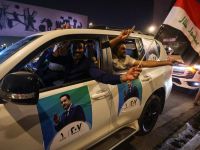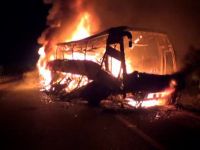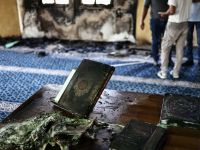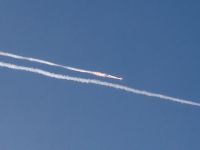An international gathering on youth in Latin America turned dramatic Friday when Cuban President Fidel Castro alleged he uncovered a plot to assassinate him during the summit.
"We have learned that terrorists plan to use firearms or explosives to achieve this goal," Castro told a press conference Friday, naming Cuban exile Luis Posadas Carriles as the mastermind of the alleged plot.
Panamanian authorities said they were "talking" to a group of three Cuban-Americans here as a result of the plot allegations. Panama's justice minister Winston Spadafora played down the incident, however.
"Castro made complaints that there were Cuban-Americans here and we are talking to them," he said, acknowledging, nonetheless, that an individual known to have been involved in attempts to kill the 74-year-old Cuban leader had visited Panama several times. No arrests had been made, according to the minister.
The Cuban American National Foundation (FNCA) denied the claims by Castro, saying they had "no basis in fact."
According to Cuban security officials, some 600 plots have been made against Castro's life since he took power in Cuba in 1959.
Two heads of state: Peru's Alberto Fujimori and Nicaragua's Arnoldo Aleman made last-minute cancellations of their plans to attend the summit.
Castro inaugurated the tenth Ibero-American summit here late Friday focusing on the suffering of the children and adolescents in the region, where, according to UNESCO figures, some 40 million children live in poverty.
"The situation of children is different in each of our countries," Castro said, speaking after Panamanian President Mireya Moscoso welcomed dignitaries from Spain, Portugal and their former colonies.
"But, all told, the reality that the children of Latin America are experiencing is evidently dramatic," he said.
The Cuban leader heralded inroads made against poverty in his own country, boasting that Cuba had managed to keep infant mortality down to 0.64 percent in children 12 months old or younger, and 0.83 percent in children aged up to five -- despite the stringent 40-year US embargo on Cuba.
On Thursday, as foreign ministers were putting the final touches to the joint declaration being prepared, Cuba was also highly visible in its refusal to back a condemnation of the armed Basque separatist group ETA.
Cuban delegates said the statement was too limited because it did not mention attacks by armed groups in other countries or foreign countries which finance them.
Relations were cool between Panama and Colombia after the Central American country excluded Colombia's defense minister from a meeting it called to discuss the regional impact of Plan Colombia.
President Andres Pastrana has launched the anti-drug plan with financial and military backing from the United States, but Colombia's neighbors are concerned over being drawn into the conflict or inundated with Colombian refugees fleeing escalating violence.
Participants were also turning their attention to Peru where speculation has been building about an early resignation by President Alberto Fujimori, who already reduced his five-year term to one after a corruption scandal.
Fujimori, currently in Japan after attending the Asia-Pacific Economic Cooperation forum in Brunei, announced late Thursday that he would not be coming to Panama for the summit.
Venezuela's Hugo Chavez, however, showed up for the summit despite an announcement Thursday that he could not attend due to emergencies caused by heavy rains in his country.
The summit is scheduled to close Saturday afternoon -- PANAMA CITY (AFP)
© 2000 Al Bawaba (www.albawaba.com)







